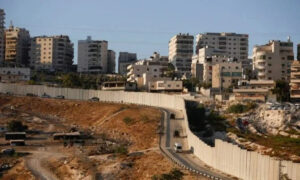 Palestinian medics raise their state of readiness to maximum following recent Israeli military measures which include blockades, checkpoints, incursions and violent crackdowns. (Reuters)
Palestinian medics raise their state of readiness to maximum following recent Israeli military measures which include blockades, checkpoints, incursions and violent crackdowns. (Reuters)
MOON Desk: Palestinian medical teams have raised their state of readiness to maximum following recent Israeli military measures which include blockades, checkpoints, incursions and violent crackdowns imposed on Nablus, Jenin and other West Bank cities.
Vacationing doctors and nurses have been told to be ready to return to work if they are required.
A senior doctor at the Palestinian Ministry of Health told Arab News: “We have asked all medical staff to be at the highest levels of readiness to respond to any emergency, and we have provided surgery rooms and supplied them with the materials and medical equipment they need, along with boosting the specialized cadre.”
He added that bullet injuries caused by Israeli soldiers are more severe this time around than during the second intifada (uprising), in which 6,000 Palestinians were killed and more than 20,000 wounded.
He said Israeli troops are aiming at the upper parts of bodies, such as the head and chest.
Journalists and photojournalists have started wearing anti-tear gas masks. They are also displaying press signs on their vehicles and using bulletproof vests.
Duha Asous, a farmer from Burin village, told Arab News that she has started storing food and gas cylinders as she cannot reach Nablus, 7 km away, due to the Israeli closure.
Asous said she is more worried about her son, a bus driver in a region that sees almost daily protests and clashes between the Palestinians and the Israeli army.
She added that many of her friends and relatives have either postponed their children’s weddings or downsized them in the wake of Palestinian deaths in neighboring areas.
Muna Musa, 20, a student at An-Najah National University in Nablus, told Arab News that she walked 7 km to reach her classes last week after a military checkpoint stopped her vehicle. The university has now gone back to online teaching, as was the case during the coronavirus pandemic.
Many students have left dorms and returned to their cities in the West Bank following the deterioration of the security situation and Israeli incursions.
Musa said: “Students from outside Nablus are thinking of not coming to the university because of the feeling of insecurity.
“The last time I came back from my university, I waited two hours at a checkpoint, then took a detour. Later, my family came to take me home in their vehicle.”
Ahmed Zawahreh, a minibus driver on the Bethlehem to Ramallah route, told Arab News his 45-minute journey now takes two hours because of Israeli checkpoints and ID checks.
Zawahreh, who is one of 40 drivers on the route, said he and his colleagues kept in touch and informed each other of checkpoint issues on a WhatsApp group.
Groups on Facebook and Telegram also keep people up to date about congestion at checkpoints.
Mahmoud Barham, mayor of Beita, southeast of Nablus, told Arab News that there are eight military checkpoints at city entrances which prevent the movement of citizens.
He added: “Only grocery stores, butchers and bakeries are operating normally, while the rest of the commercial interests have been greatly affected.”





